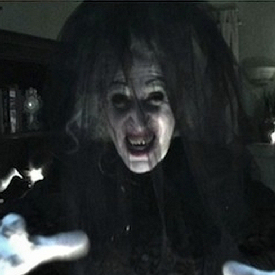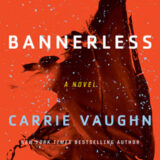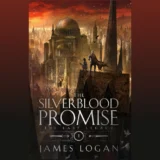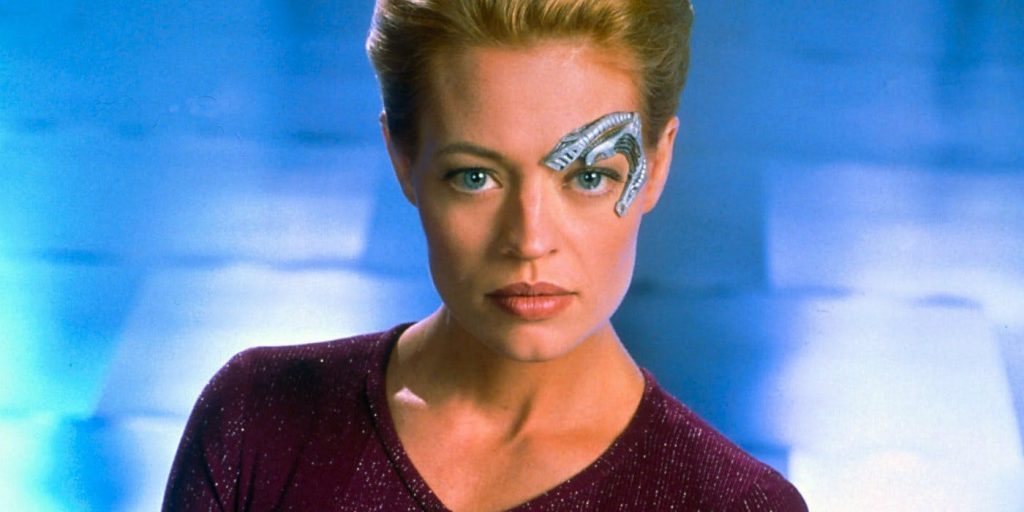
“When I was growing up, there weren’t really a lot of role models for women on television and in movies that were scientists,” the programmer and video game developer Brianna Wu told the BBC last week. (You can hear her thoughts around two hours and 48 minutes into this show.)
“I remember when Star Trek: Voyager came out, you had Jeri Ryan introduced to the cast and she was this liberated Borg and she was an engineer and an astrophysicist and a leader and for me it was so shocking to see a woman in that kind of leadership role. It really made me aware that there were other career possibilities for women out there.”
What Wu said next made me see science fiction’s diversity issues in a new light.
“I loved the original Star Trek, but you know there aren’t really a lot of women in commanding roles on that show and I know for a fact it had a detrimental effect on women of that generation going into STEM [science, technology, engineering and mathematics] careers.”

Ever since I was old enough to appreciate that there is a thing called sexism, it was clear aware that science fiction on screen has often been guilty of it. But Wu’s remarks demonstrated that this was not just about the boys refusing to let girls play in their sandbox; it has had consequences in the adult world of work and careers.
We have to be cautious when using today’s yardsticks to measure the entertainment of half a century, or more, ago. And many males fell in love with the genre at an impressionable age, when we enjoyed without guilt the succession of beautiful women who appeared on Star Trek or were carried aloft by robots and aliens in the posters for 1950s science fiction movies. But a lot of screen SF was chauvinistic in ways that would have been readily apparent to many viewers at the time.
In many SF movies, as we all know, women were love interest or screaming victims of marauding aliens.
On TV, Star Trek was a groundbreaking and progressive show in a variety of ways we all know about. It is rightly praised for having an African American woman among its principal cast, for having a crew of different nationalities, and for its enlightened view of all cultures. But it remains sad that the series did not persist with the idea of having a female first officer, as was the case in the first pilot episode. (In the series proper, the original Number One, Majel Barrett, was recast in the more traditionally female role of a nurse, while Nichelle Nichols’ Uhura is in interstellar telephonist.)
We should acknowledge that non-SF entertainment was often much more chauvinistic than SF was. And it’s important to give due credit to the movies and TV series that deserve it. Britain’s Doctor Who was far more enlightened in this respect than the popular understanding of the show would have it, while quite a few SF films did feature smart women. (In a 2005 book, Women Scientists in Fifties Science Fiction Films, author Bonnie Noonan argued that a number of genre B-movies encouraged an appreciation of women’s role in science.) But all too often, SF was disappointingly sexist.
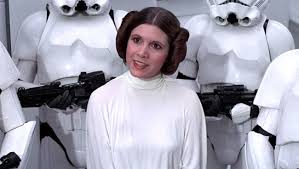
It may be that the problem lay in the fact that SF was assumed to be a product for adolescent boys. When I was an adolescent myself, the UK magazine Starburst used to run an occasional feature called Fantasy Females, in which genre actresses were presented as pin-ups. Sometimes, the accompanying text would openly mock feminists who might object to this sort of representation.
At around this time, progress was being made. Star Wars gave us a twist on the damsel-in-distress scenario by having Princess Leia be at least as resourceful as her rescuers (even if she was relegated to being the bikini-clad love interest by the third movie). The 1978 Superman gave us a tough and wisecracking Lois Lane; Alien cast Sigourney Weaver as the resilient hero, a role originally intended for a man; and the Terminator franchise made Sarah Connor the saviour of Earth. But the rate of progress was still painfully slow; the genre was only inching towards enlightenment.
Since then, we have seen a woman command the Enterprise, and watched the producers of mainstream, big-budget SF become much more conscious of equality. But in the age of the internet, sexism is more vocal than ever. If a woman gets a central role in the Star Wars franchise, plenty will complain about “social engineering” and “social justice warriors”, as well as maligning Lucasfilm head Kathleen Kennedy. And many fans will summon up a term which was coined for a different purpose in the 1970s but is now used to abuse just about any strong female character in movies: “Mary Sue”.
In her BBC interview, Brianna Wu said this of SF and the video games industry: “We have traditionally catered to a very specific kind of consumer, you know, typically male, typically younger. Then when you start having conversations like ‘Well, maybe the girl doesn’t need to be the damsel in distress that’s been kidnapped’, a lot of both the game industry and science fiction, they feel like something’s being taken away from them. They feel like outsiders are coming into their culture and trying to change it and the truth is we’ve always been here, we just always haven’t felt welcome.”
That last point gets at something particularly important: The whole genre suffers when women are marginalised. These issues should not just be about counting the number of female characters or how many lines they get in movies. The important thing is encouraging stories from a wider variety of voices. We have no idea how many great SF tales have been lost to us because of the entertainment industry’s sexism problem. And, as Wu’s comments suggest, we have no way to calculate how many girls did not grow up to be scientists or explorers.




